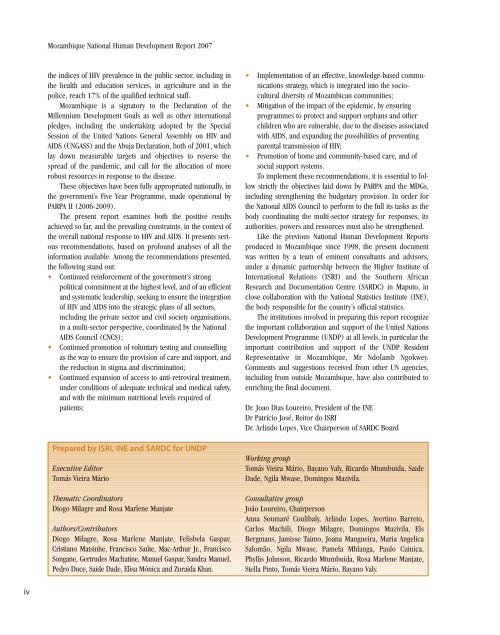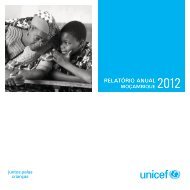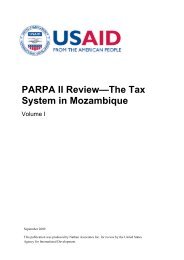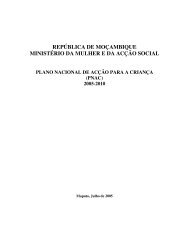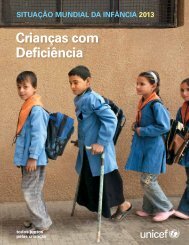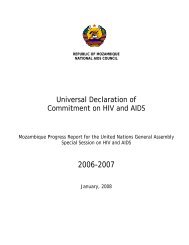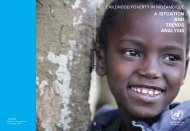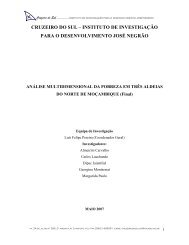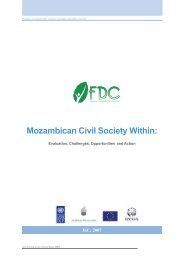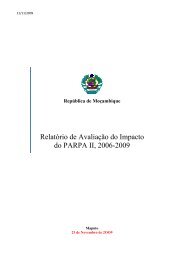English language version - Human Development Reports - United ...
English language version - Human Development Reports - United ...
English language version - Human Development Reports - United ...
- No tags were found...
You also want an ePaper? Increase the reach of your titles
YUMPU automatically turns print PDFs into web optimized ePapers that Google loves.
Mozambique National <strong>Human</strong> <strong>Development</strong> Report 2007the indices of HIV prevalence in the public sector, including inthe health and education services, in agriculture and in thepolice, reach 17% of the qualified technical staff.Mozambique is a signatory to the Declaration of theMillennium <strong>Development</strong> Goals as well as other internationalpledges, including the undertaking adopted by the SpecialSession of the <strong>United</strong> Nations General Assembly on HIV andAIDS (UNGASS) and the Abuja Declaration, both of 2001, whichlay down measurable targets and objectives to reverse thespread of the pandemic, and call for the allocation of morerobust resources in response to the disease.These objectives have been fully appropriated nationally, inthe government’s Five Year Programme, made operational byPARPA II (2006-2009).The present report examines both the positive resultsachieved so far, and the prevailing constraints, in the context ofthe overall national response to HIV and AIDS. It presents seriousrecommendations, based on profound analyses of all theinformation available. Among the recommendations presented,the following stand out:• Continued reinforcement of the government’s strongpolitical commitment at the highest level, and of an efficientand systematic leadership, seeking to ensure the integrationof HIV and AIDS into the strategic plans of all sectors,including the private sector and civil society organisations,in a multi-sector perspective, coordinated by the NationalAIDS Council (CNCS);• Continued promotion of voluntary testing and counsellingas the way to ensure the provision of care and support, andthe reduction in stigma and discrimination;• Continued expansion of access to anti-retroviral treatment,under conditions of adequate technical and medical safety,and with the minimum nutritional levels required ofpatients;Prepared by ISRI, INE and SARDC for UNDPExecutive EditorTomás Vieira MárioThematic CoordinatorsDiogo Milagre and Rosa Marlene ManjateAuthors/ContributorsDiogo Milagre, Rosa Marlene Manjate, Felisbela Gaspar,Cristiano Matsinhe, Francisco Saúte, Mac-Arthur Jr., FranciscoSongane, Gertrudes Machatine, Manuel Gaspar, Sandra Manuel,Pedro Duce, Saide Dade, Elisa Mónica and Zuraida Khan.• Implementation of an effective, knowledge-based communicationsstrategy, which is integrated into the socioculturaldiversity of Mozambican communities;• Mitigation of the impact of the epidemic, by ensuringprogrammes to protect and support orphans and otherchildren who are vulnerable, due to the diseases associatedwith AIDS, and expanding the possibilities of preventingparental transmission of HIV;• Promotion of home and community-based care, and ofsocial support systems.To implement these recommendations, it is essential to followstrictly the objectives laid down by PARPA and the MDGs,including strengthening the budgetary provision. In order forthe National AIDS Council to perform to the full its tasks as thebody coordinating the multi-sector strategy for responses, itsauthorities, powers and resources must also be strengthened.Like the previous National <strong>Human</strong> <strong>Development</strong> <strong>Reports</strong>produced in Mozambique since 1998, the present documentwas written by a team of eminent consultants and advisors,under a dynamic partnership between the Higher Institute ofInternational Relations (ISRI) and the Southern AfricanResearch and Documentation Centre (SARDC) in Maputo, inclose collaboration with the National Statistics Institute (INE),the body responsible for the country’s official statistics.The institutions involved in preparing this report recognizethe important collaboration and support of the <strong>United</strong> Nations<strong>Development</strong> Programme (UNDP) at all levels, in particular theimportant contribution and support of the UNDP ResidentRepresentative in Mozambique, Mr Ndolamb Ngokwey.Comments and suggestions received from other UN agencies,including from outside Mozambique, have also contributed toenriching the final document.Dr. Joao Dias Loureiro, President of the INEDr Patrício José, Reitor do ISRIDr. Arlindo Lopes, Vice Chairperson of SARDC BoardWorking groupTomás Vieira Mário, Bayano Valy, Ricardo Mtumbuida, SaideDade, Ngila Mwase, Domingos Mazivila.Consultative groupJoão Loureiro, ChairpersonAnna Soumaré Coulibaly, Arlindo Lopes, Avertino Barreto,Carlos Machili, Diogo Milagre, Domingos Mazivila, ElsBergmans, Jamisse Taimo, Joana Mangueira, Maria AngelicaSalomão, Ngila Mwase, Pamela Mhlanga, Paulo Cuinica,Phyllis Johnson, Ricardo Mtumbuida, Rosa Marlene Manjate,Stella Pinto, Tomás Vieira Mário, Bayano Valy.iv


